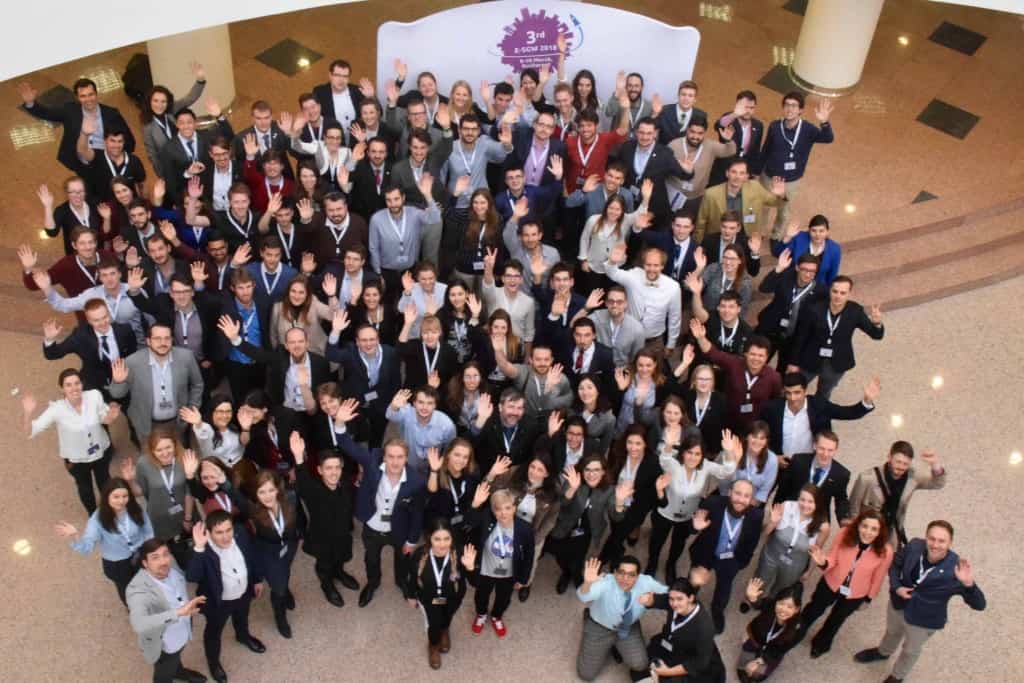After Budapest in 2016 and Paris in 2017, the 3rd edition of SGAC’s European regional network gathering brought together 100 delegates from 23 countries around Europe and beyond in Bucharest, Romania, on 9-10 March, 2018.
Hosted by the Bucharest Politehnica University, the two-day event provided delegates with the opportunity to not only listen to talks and panels, but also to benefit from peer to peer exchanges of knowledge, stories, adventures, and their passion for space. With space as the main bridging factor, students and young professionals from all across the space data value chain came together to provide their contribution on topics ranging from entrepreneurship to exploration, societal applications of space-based services, and cyber security. The structure of the event, separated into morning panels and keynotes, and afternoon working sessions, also aimed to allow for a maximum of interaction between the attendees to place the spotlight on their ideas. Experts and senior professionals also joined the event to steer discussions, optimise conversation flows, and help enhance delegate outputs. The programme outline, presentations, and topics explored during the workshop are available for your review here.
The diverse range of topics echoed the complexity of the space domain, as well as the diversity of sponsors and partners joining the event. Space agencies—the European Space Agency (ESA), the French Space Agency (CNES), the Italian Space Agency (ASI), and the Romanian Space Agency (ROSA)—and large and medium companies —GMV, ISpace, Piap Space, Inmarsat, and Space Apps—took the opportunity to share, examine, and consider key questions faced by the regional space community on the workshop’s main themes.
The Space and Cybersecurity Workshop, sponsored by ESA, invited participants to reflect on whether data should remain open source or limited in its availability and identify possible technical solutions to counteract the shape and origin of threats to cybersecurity in space. The Space Exploration session addressed the current initiatives regarding spaceflight towards Mars, as well as the habitability of the planet.
The Space Entrepreneurship session saw companies such as ISpace, PIAP Space, and PLD and discussed the extension of the space market to commercial development, as well as the challenges faced by new stakeholders in the sector when it comes to access financing and scaling up products. The sector is increasingly seeing new companies propose and implement networks of tens to thousands of small satellites—with massive amount of data to feed the industry 4.0 and IoT age. However, the presence of more hardware in popular orbits adds to the problem of space sustainability and space debris mitigation, which were touched upon during group discussions.
Nowadays, it’s impossible to imagine a modern society without space. Investments in space provide significant return in industry and commerce through the creation of spillover technology and their application to lucrative markets. Capacity building, disaster risk management, weather and climate monitoring, and water recycling are space applications that are often overlooked, but key for human and economic development. Within the Space for Society Group, delegates exchanged on how to further support the take-up of satellite-based services by users, going beyond to reaching non-space communities, as well as how can space agencies frame their missions to ensure the public perception of their utility, and thus their long-term support.
The two-day event did not set out to cover and answer all the questions that arose with regards to the four chosen themes. Rather, it sought to open a process where these questions can be taken further by delegates and transformed into concrete actions. Whether they take the shape of reports, papers, briefs, policy recommendations, future Project Groups or business ideas, delegates were strongly encouraged to build upon their work in Bucharest and continue to nurture the next generation’s perspective on space matters.



